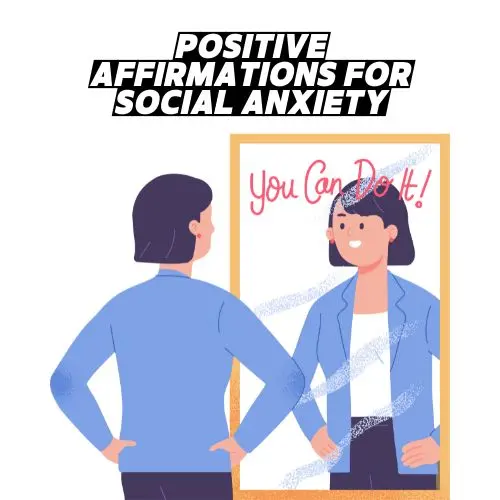Introduction
Social anxiety can significantly impact quality of life and hamper social, academic, and career success. Affirmations are a simple yet powerful tool to combat negative thought patterns. Reframing your self-talk with positive statements can help reduce anxiety and build self-confidence over time.
Using Affirmations to Overcome Social Anxiety: Key Facts and Examples
| Key Statistic | Figure |
|---|---|
| Percentage of people with social anxiety disorder | 7% of the total population |
| The most common age of onset | 13 years old |
| Percentage more common in women than men | 30% higher in women |
| Top physical symptoms | Racing heart, upset stomach, sweating, blushing |
| Top thoughts/feelings | Fear of judgment, inadequacy, embarrassment |
What Are Affirmations and How Do They Help Social Anxiety?

Affirmations are short, positive statements that are repeatedly verbalized or reflected on. By consciously replacing negative self-talk with empowering messages, new neural pathways can form in the brain. Benefits of affirmations for social anxiety include:
- Challenge distorted, irrational thoughts that trigger anxiety
- Promote self-compassion versus self-criticism
- Boost confidence and self-efficacy
- Provide motivation and encouragement
- Shift perspective from helpless to empowered
- Uplift mood and outlook
- Improve resilience and ability to cope with anxiety
Examples of detrimental inner dialogues that affirmations counteract are messages like “I’m unlikeable”, “I’ll embarrass myself” or “People will reject me.”
The regular practice of reciting affirmations can gradually rewire thought patterns to be more positive, eventually becoming automatic and subconscious.
Creating Effective Affirmations

Affirmations are most effective when they meet certain criteria:
- Positive phrasing – State what you want to be true rather than what you don’t want. “I am confident” rather than “I’m not insecure.”
- Personal perspective – Use first person language – “I am” or “My” rather than directing them at yourself. “I am worthy.”
- Present tense – Affirm as if the quality you desire is already true. “I have vibrant social connections.”
- Concise – Short, simple messages are the most impactful.
- Realistic – The statement should feel plausible, not exaggerated. “I can handle social events with grace.”
- Areas to target – Self-esteem, social skills, handling anxiety, optimism about the future.
Take some time to craft personalized statements that resonate with your specific social anxiety concerns and sources of negative self-talk.
Examples of Empowering Affirmations for Social Anxiety
Try incorporating these examples into your daily routine:
On self-worth
- I deserve to be loved for who I am.
- I accept myself just as I am.
- My unique qualities make me special.
- I am enough.
On social skills
- I can start and maintain conversations.
- I am an engaging conversationalist.
- I easily connect with all kinds of people.
On anxiety and discomfort
- Anxiety will pass, and I will be alright.
- I can handle discomfort and stay calm.
- My anxiety does not define me.
- I can conquer my social fears.
On positive thinking
- My thoughts guide my emotions in a helpful way.
- I think positively and realistically.
- Challenges make me stronger.
- My confidence is growing every day.
On taking social risks
- I have the courage to introduce myself.
- I am bold in pursuing new social connections.
- I am willing to try activities out of my comfort zone.
- Disappointments don’t discourage me.
On handling judgment
- If some people don’t appreciate me, that’s okay.
- Others’ judgments don’t determine my worth.
- As long as I’m kind, I cannot fail.
- I accept myself; that is enough.
On social events
- I easily navigate parties and social outings.
- I enjoy meeting new people.
- Social events are fun ways to connect.
- I exude charm in social settings.
On making mistakes
- Mistakes help me improve.
- I try not to judge myself harshly.
- Imperfection is part of being human.
- I can laugh at myself when I mess up.
On support systems
- I have people who care deeply about me.
- I can ask for help when I’m struggling.
- My loved ones accept me as I am.
- I am surrounded by support and encouragement.
On making progress
- I grow in courage and confidence every day.
- It’s okay to take social risks at my own pace.
- Social skills take practice, and practice takes patience.
- Each social encounter makes me more at ease.
Reciting even one or two of these affirmations whenever you feel self-doubt creeping in can help soothe anxiety and remind you of your inner strength. With regular practice, they will start to reshape how you think about yourself.
Tips for Incorporating Affirmations into Your Routine

Here are some tips for making affirmations a consistent part of your day:
- Schedule time daily – Set reminders to recite affirmations at specific intervals. First thing in the morning and at bedtime work well.
- Write them down – Keep a list of affirmations handy by your bed, in your journal, or on your phone to read regularly.
- Record yourself – Make an audio recording you can play back. Hearing yourself say them makes them feel more impactful.
- Reflect on meaning – Don’t just repeat them robotically; contemplate the essence and truth of each phrase.
- Visualize – Picture yourself embodying the affirmations. Imagine scenarios where the desired qualities manifest.
- Use reminders – Let affirmations pop up throughout your day via sticky notes, phone wallpaper, or reminders.
- Say aloud – Verbalize affirmations, don’t just think them. Or have motivational songs with positive lyrics playing.
- Pair with reflection – Combine affirmations with meditation, prayer, journaling or nature walks for added impact.
Be patient with this practice. It may feel awkward at first, but consistency is key for affirmations to become ingrained and start reprogramming your automatic thoughts.
Sample Routine Incorporating Affirmations

Here is an example routine integrating affirmations into different life domains:
Morning – Say 3-5 affirmations aloud while looking in the mirror. Write in the journal the qualities you want to cultivate.
Commute – Listen to a playlist of empowering songs with encouraging lyrics.
Work – Have a note on your monitor with a short affirmation like “I am confident and skilled”. Glance at it when you feel self-doubt.
Social events – Recite calming affirmations silently on your way to any social gathering. Picture yourself relaxed and enjoying the event.
Evening – Meditate before bed, repeating affirmations. Imagine taking the qualities you’re cultivating into your sleep and next day.
Daily actions – End your workouts or yoga sessions by stating an affirmation on strength, discipline or self-care aloud.
As needed – When faced with a stressful situation, take a quiet moment to repeat a relevant affirmation. Ex: “Anxiety will pass, and I will be alright.”
Integrating affirmations into your routines makes them more second nature. They eventually transform from recitations to genuine beliefs, providing an inner source of strength. With consistency over time, affirmations can help engender steadfast confidence that you’ll carry into every social situation.
Conclusion
In conclusion, affirmations are a valuable tool for individuals struggling with social anxiety. By consciously replacing negative self-talk with positive statements, affirmations can gradually rewire thought patterns and build self-confidence. They challenge distorted thoughts, promote self-compassion, boost confidence, and shift perspectives from helplessness to empowerment.
Creating effective affirmations involves using positive phrasing, personal perspective, present tense, conciseness, and realism. By incorporating affirmations into daily routines through recitation, writing, visualization, and reflection, individuals can experience the transformative power of affirmations. With patience and consistency, affirmations can help individuals overcome social anxiety, improve self-esteem, develop social skills, and navigate social situations with greater ease.

